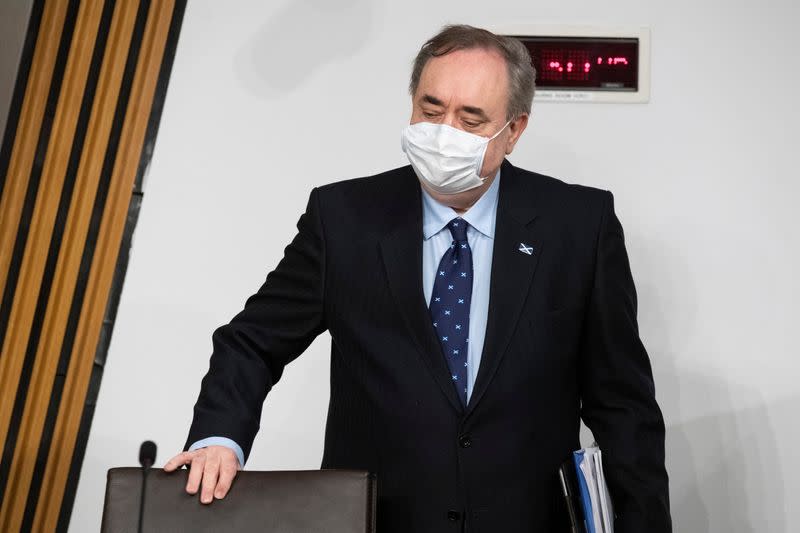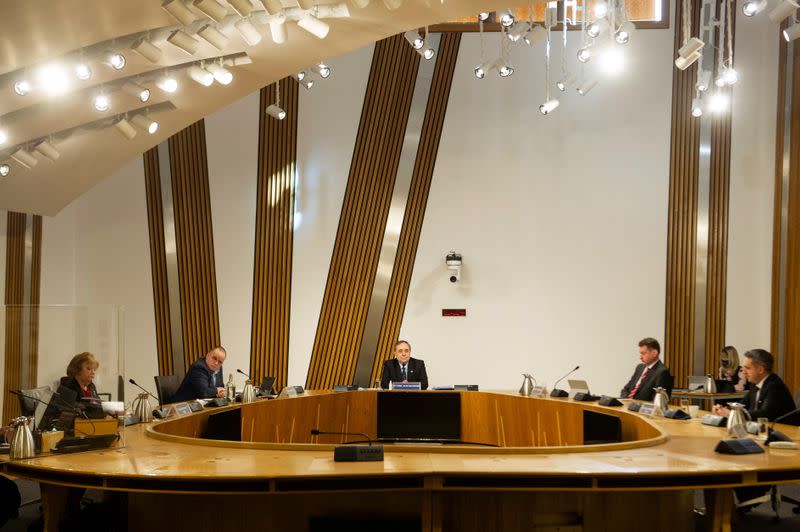In independence threat, Scotland's ex-first minister attacks government
By Elizabeth Piper and Kate Holton
LONDON (Reuters) - Scotland's former first minister Alex Salmond accused the nation's government on Friday of acting illegally and lacking leadership in a bitter row with his successor that threatens to damage the Scottish independence movement.
The feud between Salmond and his successor Nicola Sturgeon, has reached fever pitch in recent weeks, pitting the former friends against each other in a sparring match that could eventually put pressure on her to resign.
Sturgeon has denied his accusations.
First Minister Sturgeon and her bid for a second independence referendum have been riding high in opinion polls, with many praising her handling of Scotland's response to the coronavirus pandemic. Support has fallen back, although a majority still back a second referendum.
Salmond, who was cleared of committing multiple sex offences against women last year, said the handling of his case by the Scottish government had shown a failure of leadership, accusing politicians of being too close to the judiciary.
"The government acted illegally, but somehow nobody's to blame," Salmond told an inquiry into the government's handling of the case.
"Collectively these events shine a light on a government whose actions are no longer true to the principles of openness, accountability and transparency, which are the core principles on which this Scottish parliament was founded."
He added: "Some consequences should follow from unlawful conduct."
Salmond was once Sturgeon's mentor and the two of them formed a powerful partnership that made the Scottish National Party a dominant force in Scotland and took them close to winning an independence referendum in 2014, when Scots voted 55%-45% to remain in the United Kingdom.
But the allegations of sexual harassment against Salmond in 2018, which he has denied, drove a wedge between them, and resulted in the SNP becoming fractured, which could dent the party's predicted victory in a local election in May.
The row stems from Sturgeon's handling of the government's response to the case against Salmond and whether she misled parliament over the details of what and when she knew of the allegations against her predecessor.
Friday's inquiry is looking at the government and its handling of the case. Salmond described the government as having been "found to have ... acted unlawfully, unfairly and tainted by apparent bias".
On Thursday, Sturgeon told Scotland's parliament that she would answer fully to the inquiry and accused opposition politicians of siding with Salmond and sacrificing their principles on the "altar of the ego of one man".
Sturgeon wants a strong showing for her party in May's election to hand her a mandate to hold a second referendum on independence - something British Prime Minister Boris Johnson has said he will not approve.
Asked about the Salmond case, a spokesman for the British premier told reporters: "His focus and the focus of politicians through the UK should be on fighting the pandemic, working together to defeat COVID and building back better."
Scots voted against independence in a referendum in 2014 but with Britain's subsequent departure from the European Union, the movement has gained fresh momentum since Scotland wanted to stay in the bloc.
(Additional reporting by Costas Pitas and Michael Holden; Editing by Angus MacSwan and Giles Elgood)

 Yahoo Finance
Yahoo Finance 


